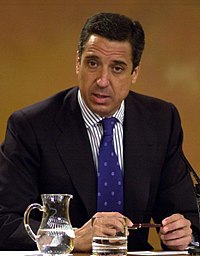Eduardo Zaplana
Eduardo Zaplana | |
|---|---|
 Eduardo Zaplana, 2004 | |
| Minister of Labor and Social Issues | |
| In office 10 July 2002 – 18 April 2004 | |
| President | José María Aznar |
| Preceded by | Juan Carlos Aparicio |
| Succeeded by | Jesús Caldera |
| President of the Valencian Government | |
| In office 3 July 1995 – 10 July 2002 | |
| Vice President | José Luis Olivas |
| Preceded by | Joan Lerma |
| Succeeded by | José Luis Olivas |
| Member of the Congress of Deputies | |
| In office 14 March 2004 – 9 March 2008 | |
| Constituency | Valencia |
| In office 9 March 2008 – 30 April 2008 | |
| Constituency | Madrid |
| Personal details | |
| Born | Eduardo Andrés Julio Zaplana Hernández-Soro 3 April 1956 Cartagena, Murcia, Spain |
| Political party | People's Party |
| Other political affiliations | Union of the Democratic Centre |
| Spouse | Rosa Barceló |
| Children | 3 |
Eduardo Andrés Julio Zaplana Hernández-Soro (born 3 April 1956) is a Spanish politician who served as Minister of Labour and Social Issues from 2002 to 2004, President of the Valencian Government from 1995 to 2002 and Spokesperson of the Partido Popular (PP) in the Spanish Congress of Deputies from 2004 to 2008.
Biography
[edit]A lawyer, Zaplana studied at the University of Alicante. After involvement in the now defunct Union of the Democratic Centre (UCD), Zaplana joined PP. He served as mayor of Benidorm from 1991 to 1994; he also served in the Valencian Regional Parliament as a deputy, becoming president of the Valencian Community in 1995, a position he held until 24 July 2002. He resigned after being appointed Minister of Employment and Social Security, a post he held until the 2004 General Election.
He served as a senator from 2002 until 2004, when he was elected to the Spanish Congress, representing Valencia and becoming PP's main spokesman in Congress.
For 2008, he changed electoral districts, moving to Madrid, where he was fourth on the PP list.[1] Following PP's election defeat in March 2008, he resigned as PP Spokesman, stating that he intended to become a backbench MP.[2] On 29 April, he resigned as PP MP altogether, announcing that he would become a European delegate for Telefónica.
In 2017, the media reported some of his opinions about Spanish conservative leaders.[3]
In May 2018, Eduardo Zaplana was arrested for money laundering and bribery. The general coordinator of PP, Fernando Martínez Maíllo, announced that party will suspend Zaplana's party membership.[4]
Personal life
[edit]He is married with three children.
References
[edit]- ^ EFE (23 January 2008). "Mato i Zaplana seran els números tres i quatre de la llista electoral del PP per Madrid". El Periódico de Catalunya (in Catalan). Madrid. Archived from the original on 6 July 2011. Retrieved 27 November 2019.
- ^ h.b. (13 March 2008). "Eduardo Zaplana quits as the Partido Popular spokesman in Congress". Typically Spanish. Archived from the original on 20 March 2008. Retrieved 27 March 2008.
- ^ "Los trapos sucios del PP, al descubierto en las grabaciones del caso Lezo". Cadena SER (in Spanish). Madrid. 15 November 2017. Retrieved 27 November 2019.
- ^ "The PP announces that it will suspend from militancy to Zaplana". Turkey Telegraph. 22 May 2018. Archived from the original on 7 July 2018. Retrieved 27 November 2019.
External links
[edit]- Biography at Spanish Congress site. [1]
- Transcription of telephone conversation between Eduardo Zaplana and Salvador Palop related to the Naseiro corruption case (in Spanish). [2] Archived 2009-12-15 at the Wayback Machine
- 1956 births
- Living people
- Presidents of the Valencian Government
- Politicians from Cartagena, Spain
- Members of the 8th Congress of Deputies (Spain)
- Members of the 9th Congress of Deputies (Spain)
- Members of the Senate of Spain
- Prisoners and detainees of Spain
- Spanish politicians convicted of crimes
- Spanish prisoners and detainees
- Mayors of places in the Valencian Community
- Members of the 3rd Corts Valencianes
- Members of the 4th Corts Valencianes
- Members of the 5th Corts Valencianes
- People's Party (Spain) politicians
- People's Party of the Valencian Community politicians
- University of Alicante alumni
